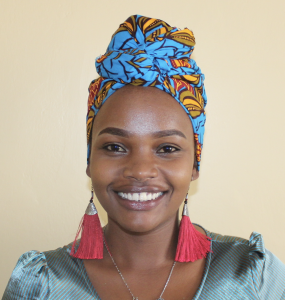March, 2020: Ebukhayi Primary School Project Complete!
Ebukhayi Primary School in Kenya now has access to a new source of safe, clean water thanks to the completion of their rain tank, which has the ability to collect 50,000 liters of water. We installed new latrines and handwashing stations for students, and we trained students and staff on improved sanitation and hygiene practices. All of these components work together to unlock the opportunity for these students to live better, healthier lives.

Students celebrate flowing water from the new rain tank
Rain Tank
Construction for this 50,000-liter rain tank was successful!
Parents, staff, and students helped our artisans gather everything needed for construction. All the while, the school cooks prepared meals for the artisans, and the school provided accommodations for the artisans during their work. Local women and men helped our artisans with their manual labor, too.
The process officially began with our staff and school administration looking around the school compound to try and determine the best location for a new rain tank. This needed to be the best site with good, clean roofing to catch the rainwater.

Adjusting the wire on top of the rain tank's stone foundation
Then, we cleared the site by excavating the soil within the required measurements to make level ground for the tank foundation. The foundation was cast by laying hardcore on level ground and then reinforcing it using steel, concrete and waterproof cement.

Foreground: A laborer digs the access point to the tap; Background: Field Officer Christine Masinde checks in with the artisan on progress
Both the drawing pipe as well as the washout pipe were affixed as the foundation was laid. The wall was built with ferro-cement techniques through 6 layers. The inner wall was plastered while rough casting was done on the outer part. Finally, the catchment area was dug, plastered, and a short staircase installed.

Laying out wire mesh on top of dome rebar
Dome construction could begin after the superstructure had been given enough time to settle. The manhole cover was fitted, inlet pipes were connected to the roof gutters, inlet screens, ventilation pipes (breathers) and overflow pipes were all done to standard.
Once finished, the rain tank was given 3 weeks to undergo complete curing before it was cleaned and handed over to Ebukhayi Primary School, though we will continue to offer them unmatchable support as a part of our monitoring and maintenance program.

A pupil gives thumbs up for a fresh drink from the rain tank
As soon as the tank was ready for use, students and staff celebrated the presence of clean water on campus. The event was a great chance for us to acknowledge the school administration and students as the primary parties entrusted with the tools we’ve given, as well as remind them of our continued support as they develop. Happiness, thanksgiving, and appreciation were the order of the day flowing in all directions.
We heard closing remarks from the student Chair of the new health club as well as the sanitation teacher, Mrs. Jacquelene Mukhwana. Each thanked our team for the facilities provided to them. The head teacher Mr. Morris Opala, the School Board of Management Chair, and the parents were very grateful for the good work done in the school and promised to maintain the facilities for the longest time.

Slurp! A student enjoys a drink from the rain tank
"The tank is very beautiful. The water from the hand-dug well is very dirty which we use for cleaning purposes only. Bringing drinking and cooking water from home is now in the past. We are very happy to have access to so much clean and safe water," said student Redempta.
VIP Latrines
This project funded the installation of 6 new ventilated improved pit (VIP) latrines, half for girls and half for boys. Due to the layout of the school and the best available spot to dig the latrine pits, we decided to do all 6 doors in 1 block. Their division of use between the girls and boys will be maintained, however.

Girls posing with their half of the new latrines
All of these new latrines have cement floors that are designed to be easy to use and clean. And with a rain tank right on school property, there should be enough water to keep them clean.

Boys pose with their half of the latrines
Handwashing Stations
The 2 handwashing stations were set up during training and handed over to the student health club. These were placed outside of the girls’ and boys’ latrines to encourage handwashing after latrine use. Health club members will teach other students how to properly wash their hands at the stations, make sure the stations are filled with water, and work to ensure that there is always a cleaning agent such as soap or ash available.

A student uses a handwashing station
New Knowledge
Hygiene and sanitation training was scheduled with the help of the school principal and Head Teacher Morris Opala, who together ensured that the training date would be convenient for students, staff, and parent representatives. Individual teachers helped by selecting students from each class to represent the others.
20 pupils attended training in addition to several staff members, including the teacher in charge of health and sanitation, Mrs. Jacquelene Mukhwana. The sun was scorching hot that morning and since the school does not have any large trees to offer shade, we sat inside one of the classrooms. Luckily, the classroom was cool enough for us to conduct the training comfortably.

Trainer Georgina Kamau leads the session and has lots of student participation
We covered a number of topics including personal hygiene such as bathing, oral hygiene, and the 10 steps of handwashing; environmental hygiene; child rights; operation and maintenance of the rain tank, latrines, and handwashing stations; and leadership and governance. During the latter, the students elected their peers to lead their newly formed student health club.
The club will be greatly involved in the WaSH project management at school and will be responsible for encouraging good health and hygiene practices amongst their peers, teachers, and the larger community. We involved stretches, dances, and physical activities in between each topic to keep the pupils' energy up and their minds active. By the end of the training, each pupil understood their role in sustaining clean water and good health within their school community.

Time for a stretch with Trainer Ian Nakitare
The participants were active throughout the entire day, grabbing the training concepts very well and answering all questions when asked. The formation of the student health club was of particular interest to the students, who were excited to be pioneers of the club and the monitors of the new WaSH facilities. This club is now officially the second club in the school which will be meeting every Thursday of the week.

A pupil demonstrates toothbrushing during the dental hygiene session
Another topic that was special for this group was our discussion on all the ways one can be healthy. The facilitator explained the multiple aspects of health such as physically, spiritually, mentally, socially, economically, emotionally, and environmentally. The participants learned that they should take care of their bodies to ensure good health so as to avoid unnecessary diseases. We also stressed the importance of integrity and why it is important to do the right thing even without being monitored.

Trainer Ian leads the 10 steps of handwashing
"This training will help the students understand their efforts as a school in the project and to motivate and encourage them to maintain the facilities provided to them, which will in return improve their lifestyle is school as well as their health," said Deputy Head Teacher Nickson Okwaro.
Thank you for making all of this possible!


 Rainwater Catchment
Rainwater Catchment
 Rehabilitation Project
Rehabilitation Project



































